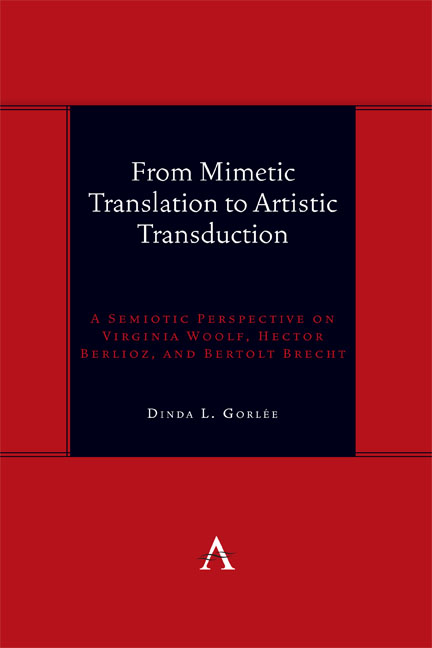 From Mimetic Translation to Artistic Transduction
From Mimetic Translation to Artistic Transduction Book contents
- Frontmatter
- Dedication
- Contents
- 1 Forked Tongues: Theory from Translation to Transduction
- 2 Wave after Wave: Wagner’s Waves Eclipsed by Virginia Woolf
- 3 War and Love: The Parabolic Retranslation in Berlioz’s Opera
- 4 The Threepenny Opera: Jakobson’s Poetics Retranslated in the Spirit of Brecht’s Work-Plays
- Bibliography
- Index
4 - The Threepenny Opera: Jakobson’s Poetics Retranslated in the Spirit of Brecht’s Work-Plays
Published online by Cambridge University Press: 01 March 2024
- Frontmatter
- Dedication
- Contents
- 1 Forked Tongues: Theory from Translation to Transduction
- 2 Wave after Wave: Wagner’s Waves Eclipsed by Virginia Woolf
- 3 War and Love: The Parabolic Retranslation in Berlioz’s Opera
- 4 The Threepenny Opera: Jakobson’s Poetics Retranslated in the Spirit of Brecht’s Work-Plays
- Bibliography
- Index
Summary
New Tongues for Brecht's Language
The dramatic genre of opera in its modern form has abandoned the old, static poetry of formal text-with-music in response to the attraction of dynamic and unconventional rhymes, dramatic sounds and satirical melodies, thus introducing new art forms (Kerman 1956/1989, 203–213). Alternative opera developed from the operatic tradition in its exploration of new subjects and themes, accepting contemporary vocabulary and speech to intensify the lyrical effect in conjunction with modern rhyme and tempo. This allowed a remix of scenic effects to create new dramas (Kerman 1956/1989, 214–228). Indeed, the new form of contemporary drama with songs and music, along with new sets, different lighting and a readaptation of the costumes, revived the stages of opera and operetta by emphasizing the emotional gestures of the actors (Pavis 1980, 133–134, 191–195, 262–263, 354–356). Brecht's new song-play genre featured an unconventional, modern style of declamation (Sprechstimme). This “speech song” consisted of a half-singing, half-speaking recital of lyrical texts which were similar to the twentieth century's harmonic, but dissonant, arias. Sprechstimme echoed the eclectic and dissonant schizophrenia of the international politics that formed the backdrop of reality in the twentieth century. Brecht personified the new voices in his sketches using variations to and elaborations on German theater, a process which Jakobson termed as cryptanalytical hypertranslation.
Onstage, the dramaturgic effects of modern opera were altered through the mimetic involvement of playwrights in order to move away from the old, familiar tradition of the audience being amused by the amorous events depicted in Italian opera which resolved into a happy ending. Instead, Brecht manipulated his modern dramas in educative theater by offsetting the pleasure of the audience with a contrastive feeling of displeasure. Brecht coined the term Verfremdungseffekt (alienation effect) for his method. He used (and abused) the emotionality of the German music drama (Singspiel) genre while preaching the sacred and secular themes of the melodramatic action by recoding the language in the popular speech spoken by the “street” classes. Jakobson splendidly discussed the contrastive structure of Brecht's lyrics in his article, “Der grammatische Bau des Gedichts von B. Brecht ‘Wie sind sie’” ( Jakobson 1963/1981).
- Type
- Chapter
- Information
- From Mimetic Translation to Artistic TransductionA Semiotic Perspective on Virginia Woolf, Hector Berlioz, and Bertolt Brecht, pp. 129 - 174Publisher: Anthem PressPrint publication year: 2023


